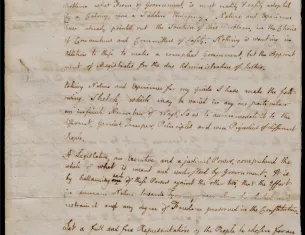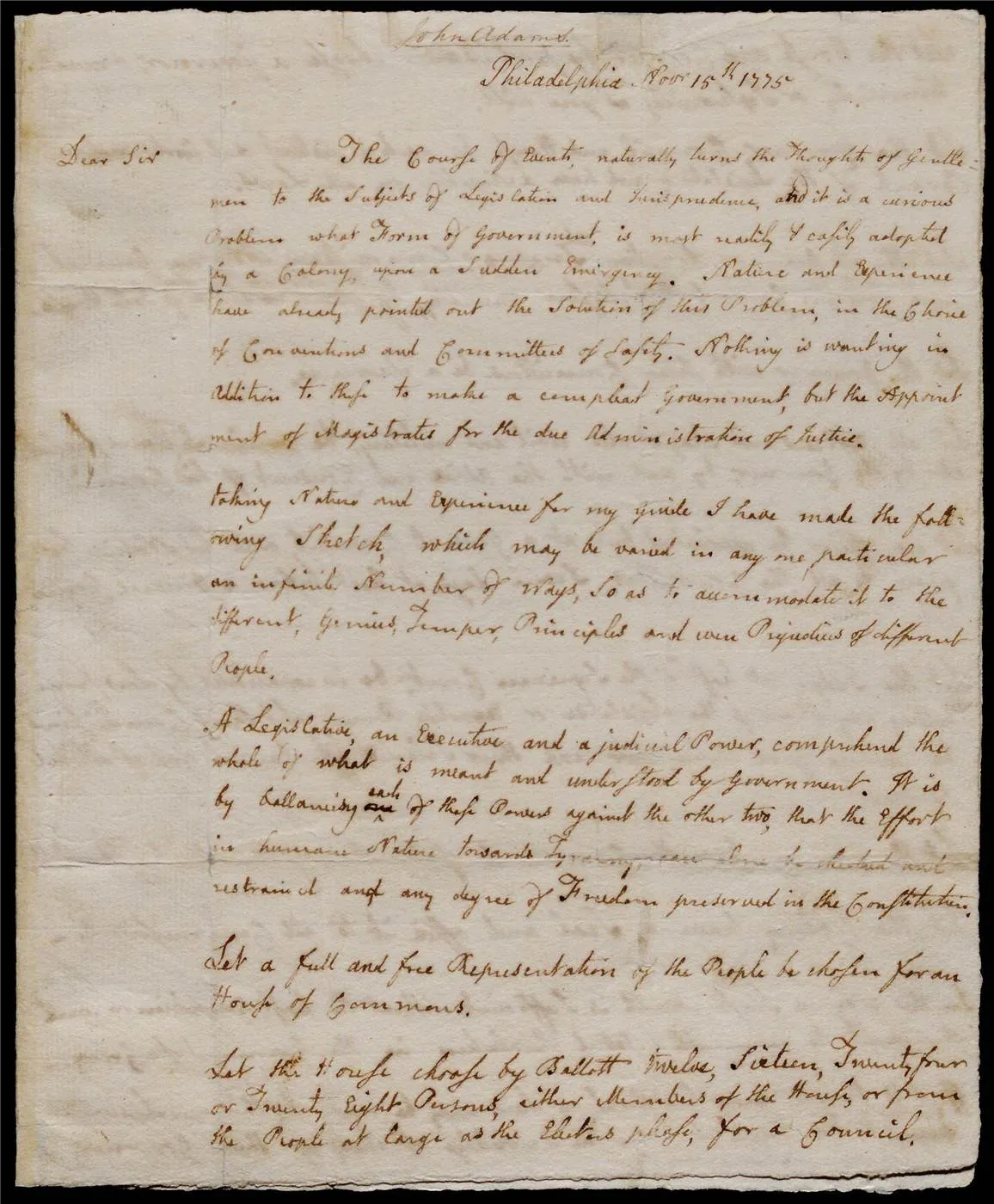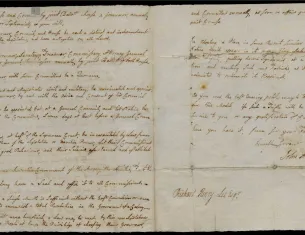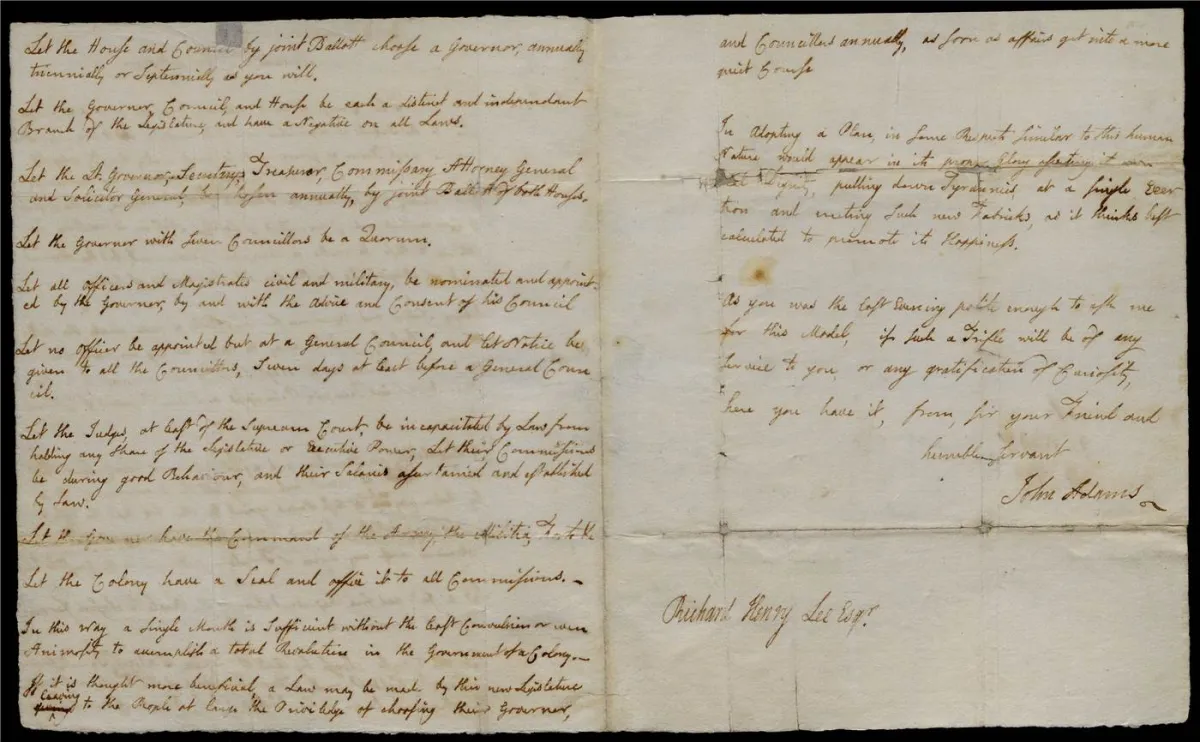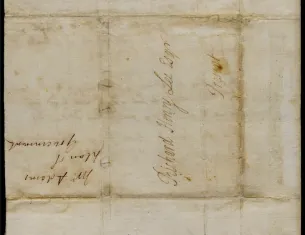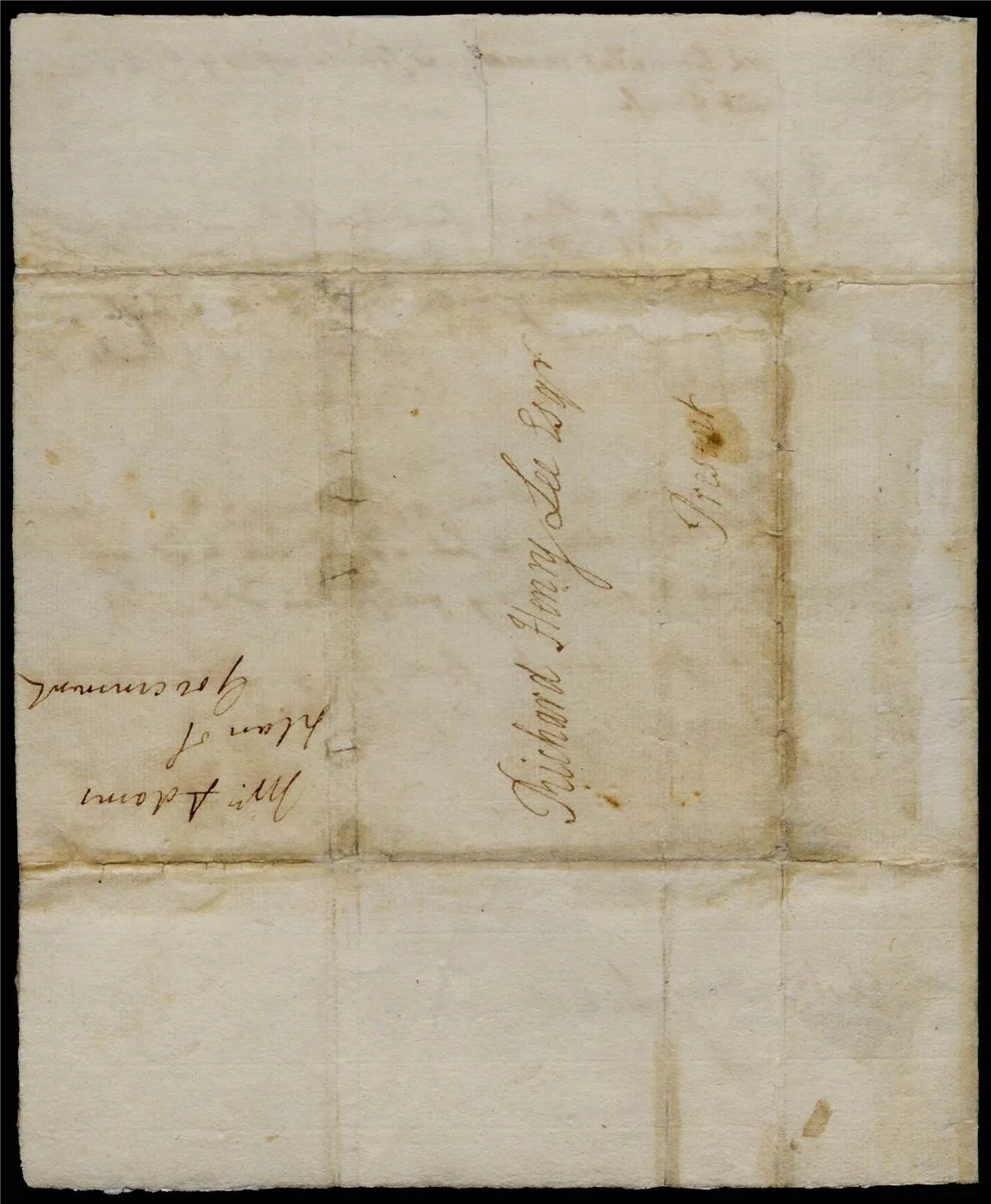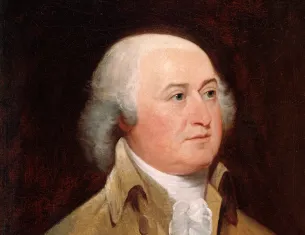John Adams on a New Form of Government, 1775
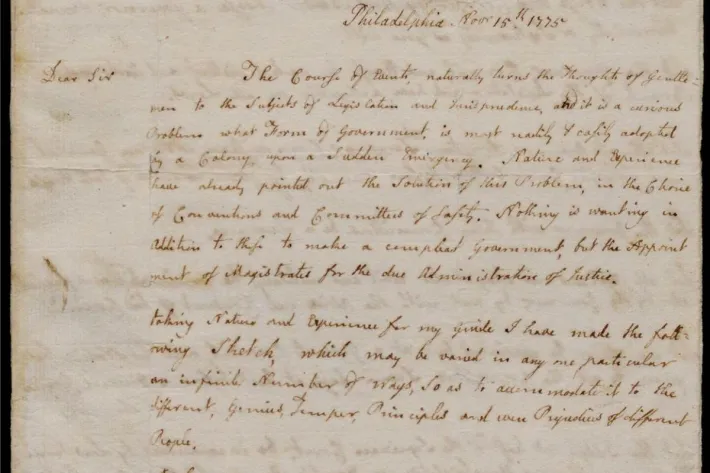
John Adams, Letter to Richard Henry Lee, November 15, 1775 (Gilder Lehrman Collection)
More than a decade before the Constitutional Convention in 1787—and months before the United States declared independence—John Adams wrote a plan for a new form of government for the American colonies. He described the basic structure of what would become the American government, including the separation of powers: “A Legislative, an Executive and a judicial Power, comprehend the whole of what is meant and understood by Government.” The ideas presented in this letter had a profound influence on the state constitutions of Virginia, New York, Massachusetts, and ultimately, the federal Constitution as the delegates created the “wisest and happiest government that human wisdom can contrive.”
A Letter from John Adams to Richard Henry Lee, November 15, 1775
John Adams.
Philadelphia. Novr 15th 1775
Dear Sir
The Course of Events, naturally turns the Thoughts of Gentlemen to the Subjects of Legislation and Jurisprudence, and it is a curious Problem what Form of Government, is most readily & easily adopted by a Colony, upon a Sudden Emergency. Nature and Experience have already pointed out the Solution of this Problem, in the Choice of Conventions and Committees of Safety. Nothing is wanting in Addition to these to make a compleat Government, but the Appointment of Magistrates for the due Administration of Justice.
taking Nature and Experience for my Guide I have made the following Sketch, which may be varied in any one particular an infinite Number of Ways, So as to accommodate it to the different, Genius, Temper, Principles and even Prejudices of different People.
A Legislative, an Executive and a judicial Power, comprehend the whole of what is meant and understood by Government. It is by ballancing each of these Powers against the other two, that the Effort in human Nature towards Tyranny can alone be checked and restrained and any degree of Freedom preserved in the Constitution.
Let a full and free Representation of the People be chosen for an House of Commons.
Let the House choose by Ballott twelve, Sixteen, Twenty four or Twenty Eight Persons, either Members of the House or from the People at large as the Electors please, for a Council.
Let the House and Council by joint Ballott choose a Governor, annually triennially or Septennially as you will.
Let the Governor, Council, and the House be each a distinct and independant Branch of the Legislature, and have a Negative on all Laws.
Let the Lt. Governor, Secretary, Treasurer, Commissary Attorney General and Solicitor General, be chosen annually, by joint Ballott of both Houses.
Let the Governor with Seven Councillors be a Quorum.
Let all officers and Magistrates civil and military, be nominated and appointed by the Governor, by and with the Advice and Consent of his Council
Let no officer be appointed but at a General Council, and let Notice be given to all the Councillors, Seven days at least before a General Council.
Let the Judges, at least of the Supreme Court, be incapacitated by Law from holding any Share of the Legislative or Executive Power, Let their Commissions be during good Behaviour, and their Salaries ascertained and established by Law.
Let the Governor have the Command of the Army, the Militia, Forts &c
Let the Colony have a Seal and affix it to all Commissions.
In this way a Single Mouth is Sufficient without the least Convulsion or even Animosity to accomplish a total Revolution in the Government of a Colony. –
If it is thought more beneficial, a Law may be made by this new Legislature leaving to the People at large the Priviledge of choosing their Governor, and Councillors annually, as Soon as affairs get into a more quiet Course
In Adopting a Plan, in Some Respects Similar to this human Nature would appear in its proper Glory asserting its own [re]al Dignity, pulling down Tyrannies, at a Single Exertion and erecting Such new Fabricks, as it thinks best calculated to promote its Happiness.
As you was the last Evening polite enough to ask me for this Model, if such a Trifle will be of any Service to you, or any gratification of Curiosity, here you have it, from, Sir your Friend and
humble Servant
John Adams
Source: John Adams to Richard Henry Lee, November 15, 1775, The Gilder Lehrman Institute of American History, GLC03864.
Excerpts from a Letter from John Adams to Richard Henry Lee, November 15, 1775
Dear Sir,
The course of events naturally turns the Thoughts of gentlemen to the subjects of Legislation and Jurisprudence, and it is a curious Problem what Form of Government, is most readily & easily adopted by a Colony, upon a Sudden Emergency. Nature and Experience have already pointed out the Solution of this Problem, in the Choice of Conventions and Committees of Safety. Nothing is wanting in Addition to these to make a compleat Government, but the Appointment of Magistrates for the due Administration of Justice.
taking Nature and Experience for my Guide I have made the following Sketch, which may be varied in any one particular an infinite Number of Ways, So as to accommodate it to the different Genius, Temper, Principles and even Prejudices of different People.
A Legislative, an Executive and a judicial Power, comprehend the whole of what is meant and understood by Government. It is by ballancing each of these Powers against the other two, that the Effort in human nature towards Tyranny can alone be checked and restrained and any degree of Freedom preserved in the Constitution. . . .
Source: John Adams to Richard Henry Lee, November 15, 1775, The Gilder Lehrman Institute of American History, GLC03864.
Background
More than a decade before the Constitutional Convention in 1787—and months before the United States declared independence—John Adams wrote a plan for a new form of government for the American colonies. He described the basic structure of what would become the American government, including the separation of powers: “A Legislative, an Executive and a judicial Power, comprehend the whole of what is meant and understood by Government.” The ideas presented in this letter had a profound influence on the state constitutions of Virginia, New York, Massachusetts, and ultimately, the federal Constitution as the delegates created the “wisest and happiest government that human wisdom can contrive.”
Transcript
A Letter from John Adams to Richard Henry Lee, November 15, 1775
John Adams.
Philadelphia. Novr 15th 1775
Dear Sir
The Course of Events, naturally turns the Thoughts of Gentlemen to the Subjects of Legislation and Jurisprudence, and it is a curious Problem what Form of Government, is most readily & easily adopted by a Colony, upon a Sudden Emergency. Nature and Experience have already pointed out the Solution of this Problem, in the Choice of Conventions and Committees of Safety. Nothing is wanting in Addition to these to make a compleat Government, but the Appointment of Magistrates for the due Administration of Justice.
taking Nature and Experience for my Guide I have made the following Sketch, which may be varied in any one particular an infinite Number of Ways, So as to accommodate it to the different, Genius, Temper, Principles and even Prejudices of different People.
A Legislative, an Executive and a judicial Power, comprehend the whole of what is meant and understood by Government. It is by ballancing each of these Powers against the other two, that the Effort in human Nature towards Tyranny can alone be checked and restrained and any degree of Freedom preserved in the Constitution.
Let a full and free Representation of the People be chosen for an House of Commons.
Let the House choose by Ballott twelve, Sixteen, Twenty four or Twenty Eight Persons, either Members of the House or from the People at large as the Electors please, for a Council.
Let the House and Council by joint Ballott choose a Governor, annually triennially or Septennially as you will.
Let the Governor, Council, and the House be each a distinct and independant Branch of the Legislature, and have a Negative on all Laws.
Let the Lt. Governor, Secretary, Treasurer, Commissary Attorney General and Solicitor General, be chosen annually, by joint Ballott of both Houses.
Let the Governor with Seven Councillors be a Quorum.
Let all officers and Magistrates civil and military, be nominated and appointed by the Governor, by and with the Advice and Consent of his Council
Let no officer be appointed but at a General Council, and let Notice be given to all the Councillors, Seven days at least before a General Council.
Let the Judges, at least of the Supreme Court, be incapacitated by Law from holding any Share of the Legislative or Executive Power, Let their Commissions be during good Behaviour, and their Salaries ascertained and established by Law.
Let the Governor have the Command of the Army, the Militia, Forts &c
Let the Colony have a Seal and affix it to all Commissions.
In this way a Single Mouth is Sufficient without the least Convulsion or even Animosity to accomplish a total Revolution in the Government of a Colony. –
If it is thought more beneficial, a Law may be made by this new Legislature leaving to the People at large the Priviledge of choosing their Governor, and Councillors annually, as Soon as affairs get into a more quiet Course
In Adopting a Plan, in Some Respects Similar to this human Nature would appear in its proper Glory asserting its own [re]al Dignity, pulling down Tyrannies, at a Single Exertion and erecting Such new Fabricks, as it thinks best calculated to promote its Happiness.
As you was the last Evening polite enough to ask me for this Model, if such a Trifle will be of any Service to you, or any gratification of Curiosity, here you have it, from, Sir your Friend and
humble Servant
John Adams
Source: John Adams to Richard Henry Lee, November 15, 1775, The Gilder Lehrman Institute of American History, GLC03864.
Excerpt
Excerpts from a Letter from John Adams to Richard Henry Lee, November 15, 1775
Dear Sir,
The course of events naturally turns the Thoughts of gentlemen to the subjects of Legislation and Jurisprudence, and it is a curious Problem what Form of Government, is most readily & easily adopted by a Colony, upon a Sudden Emergency. Nature and Experience have already pointed out the Solution of this Problem, in the Choice of Conventions and Committees of Safety. Nothing is wanting in Addition to these to make a compleat Government, but the Appointment of Magistrates for the due Administration of Justice.
taking Nature and Experience for my Guide I have made the following Sketch, which may be varied in any one particular an infinite Number of Ways, So as to accommodate it to the different Genius, Temper, Principles and even Prejudices of different People.
A Legislative, an Executive and a judicial Power, comprehend the whole of what is meant and understood by Government. It is by ballancing each of these Powers against the other two, that the Effort in human nature towards Tyranny can alone be checked and restrained and any degree of Freedom preserved in the Constitution. . . .
Source: John Adams to Richard Henry Lee, November 15, 1775, The Gilder Lehrman Institute of American History, GLC03864.
